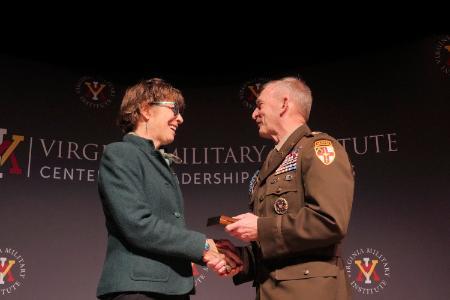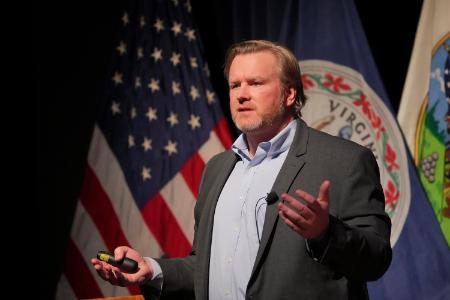35th Annual Environment Virginia Symposium Held at VMI

Col. Dave Gray congratulates Tanya Denckla Cobb, this year’s recipient of the Erchul Environmental Leadership Award, in Gillis Theater. –VMI Photo by H. Lockwood McLaughlin.
LEXINGTON, Va. April 14, 2025 — The 35th annual Environment Virginia Symposium at Virginia Military Institute was held April 8-10. The unseasonably chilly weather did not deter nearly 500 representatives from state and local governments, nonprofit organizations, higher education, and the private sector from attending nor did it stifle their enthusiasm. The conference was organized and co-hosted by the Center for Leadership & Ethics (CLE). Col. Dave Gray, executive director of the CLE, served as master of ceremonies.
Opening remarks were offered by Matthew Lohr, secretary of Agriculture and Forestry, and Stefanie Taillon, acting secretary of Natural and Historic Resources.
Breakout session topics included conserving Virginia’s natural diversity, water-quality in the Chesapeake Bay, resilient coasts and wetlands, data tools, ecosystems health and fisheries, solar power, parks and recreation, composting, conservation, forest regeneration, stormwater management, beneficial use of dredge material, flood risk management, offshore wind projects, oyster resources, clean water, and more.
The agency directors panel was moderated by Margaret L. “Peggy” Sanner, former executive director of the Chesapeake Bay Foundation, and featured five state government officials from the conference’s co-hosting agencies: Ryan Brown, executive director of the Department of Wildlife Resources; Rob Farrell, director of the Department of Forestry; Jamie Green, commissioner of the Virginia Marine Resources Commission; Mike Rolband, director of the Department of Environmental Quality; and Matthew Wells, director of the Department of Conservation and Recreation.
The plenary speaker was Ben Byboth, who leads commercial strategy and business development at Commonwealth Fusion Systems (CFS), the world’s largest and leading commercial fusion company, headquartered in Devens, Massachusetts. Byboth discussed fusion power, a subject he is extremely passionate about, and CFS’s multi-billion dollar investment to build, own and operate the world’s first grid-scale commercial fusion power plant, at the James River Industrial Center in Chesterfield County, Virginia. The power plant, called ARC, will produce about 400 megawatts of clean, zero-carbon power that will help meet the commonwealth’s growing demand for electricity. CFS expects to start generating power with ARC in the early 2030s.
Byboth explained that fusion is the most common reaction in the universe. “Over 99.99% of all energy comes from fusion, in the form of what happens in the stars. Hot plasmas are confined by gravity to make and fuse particles together to make energy, and in the process releasing enough energy to power our solar systems.” He stated that fusion is the opposite process of fission, which takes big, heavy particles and breaks them apart, releasing energy.
“Fusion combines the most abundant and lightest isotopes to make heavier ones, and in the process, releases about four times more energy than a fission reaction, and about several 100 million times more than just burning something.”
Byboth reported that fusion has many positive attributes.
“It’s clean, helium is the only real byproduct of the reaction. It’s safe, not subject to runaways or meltdowns. There’s no long-lived nuclear waste, and there’s no significant health or safety impacts to the environment. It is available on demand and can be ramped up if you need more, or ramped down if you need less. It can be integrated with renewables. It can be deployed around the world and is very scalable. It is a fundamental shift from the way we currently think about energy, which is the hunting and gathering resources, the scavenging of things, digging up things and burning them. It is moving away from those to energy as a technology, and breaking the tether from these other resources.”
He stated that research with fusion has been going on since the 1950s.
“We’ve been making progress toward a goal where the fusion reaction actually produces more energy than it takes to run the reaction. It takes a lot of work to cultivate the environment, to keep a little bit of a star comfortable in a bottle.” 
Before joining CFS, Byboth held leadership roles at Eversource, Entergy, and NextEra, where he launched new energy businesses, led modernization of the grid, and developed new and innovative regulatory strategies. A U.S. Navy veteran and former nuclear plant operator, his career spans legacy nuclear fission, renewables, storage, and grid modernization. He holds an MBA from Tulane University and a bachelor’s degree in nuclear engineering technologies. More about CFS and the ARC power plant can be found at cfs.energy.
A meaningful part of the annual symposium is the announcement of the winner of the Erchul Environmental Leadership Award. This year’s winner was Tanya Denckla Cobb, director of the University of Virginia’s Institute for Engagement & Negotiation (IEN). The award recognizes a Virginian who has made significant individual efforts to improve the environment. Members of Virginia’s environmental community nominate candidates who are judged based on their vision, expertise, commitment, integrity, communication skills, accomplishments, and diplomacy. The award is named for the late VMI professor Capt. Ronald A. Erchul, Ph.D., founder of the Environment Virginia Symposium.
According to Sanner, who received the award last year, Cobb has served as the director of IEN since 2015. Her work involves overseeing the facilitation and mediation of a broad range of community and environmental issues, as well as a wide range of training in conflict management and negotiations.
“Tanya and her staff continue to develop new approaches to old issues and new challenges, developing creative, innovative and effective ways of engaging people and solving problems. Over the years, Tanya has worked with communities across the commonwealth, as well as numerous industry, governmental, indigenous and nonprofit organizations. She’s well known in Virginia’s environmental community, highly regarded and well liked. Tanya is very deserving of the Erchul Environmental Leadership Award for her commitment to Virginia’s environment, its communities, and its citizens.”
Cobb stated she was honored to receive the award. She told the assembly, “You all in this room are on the front line in conserving our forest lands, cleaning up our waterways, creating corridors and habitats for our wildlife. You are the wheels helping to create sustainable pathways forward, and me and my small but very mighty team at IEN, I’ve always thought of as the grease in those wheels. Through facilitation and consensus building and training, we are the grease trying to help you find that common ground, and create the pathways forward. In my mind, I thought, ‘What the heck, I’ve heard of bicycles getting awards, but when does grease ever get an award?” she quipped. She shared with her peers that they too, can be the grease in the wheel of their organizations and their interpersonal relationships. “You can do something radical. You can reach out to someone. Maybe it is someone sitting on the sideline not participating. Maybe it’s someone on the opposite side of the issue from you. Have the courage and the intention to suspend judgment, use your compassion and caring to extend grace, listen more deeply, bring curiosity, ask only questions of the other. Most of all, reach out sooner than later. It is often hard, but it is rewarding, and it works.”
Each year, Virginia Military Institute donates $1,500 to a nonprofit environmental organization of the recipient’s choice in their honor. Cobb has requested this donation be made to the Virginia Natural Resources Leadership Institute.
Other awards presented at the symposium are the Governor’s Environmental Excellence Awards, which recognize successful and innovative efforts that improve Virginia’s environment. This year’s gold medal winners were: Department of Defense – Chesapeake Bay Program: The Department of Defense (DoD) was one of the first federal departments to be formally involved in Chesapeake Bay watershed restoration efforts. Through efforts such as designing living shorelines, designating Sentinel Landscapes and installing agricultural best management practices on federal properties, the DoD has advanced the goals and outcomes of the Chesapeake Bay Watershed Agreement in Virginia. Their efforts not only sustain but improve the health of the Bay and the welfare of the Commonwealth’s residents; Hampton Roads Sanitation District – James River Land Improvements – Trails Phase I: Hampton Roads Sanitation District (HRSD), in partnership with the City of Newport News, developed a mile of new trails around Riverview Farm Park as part of the Sustainable Water Initiative for Tomorrow program. Located near its James River Treatment Plant, HRSD completed the first phase of trail upgrades to Riverview Farm Park including a new trail system with boardwalks along Flax Mill Creek, Deep Creek and the James River; and Naval Weapons Station Yorktown – Penniman Spit Living Shoreline Project – Installation Resilience and Ecosystem Enhancement: The U.S. Navy partnered with Virginia Institute for Marine Science to design and permit a living shoreline restoration project. Through this project, Naval Weapons Station Yorktown reduced erosion along three miles of shoreline, fortified federal Superfund sites, protected military training grounds, complied with the Sikes Act for natural resource protection and supported the 2014 Chesapeake Bay Agreement’s environmental objectives – all preserving the unique ecosystem of the York River. -450x300.jpg)
Silver medal winners were: Giles County - Trail Center at Mountain Lake Lodge; Arlington County Department of Environmental Services - Ballston Wetland Park; Historic Germanna - Siegen Forest Tract & Germanna Ford Boat Launch; Department of Corrections - State Farm Correctional Complex - State Farm Conservation Project – James River Subwatershed Restoration; and The Mariners’ Museum and Park - Mariners’ Environmental Initiative.
Bronze medal awards were: Arlington County Solid Waste Bureau - On-street Food Scraps Collection for Multi-family Building Residents; Fairfax County Park Authority Farmers Market Program - Food Scrap Collection at the Farmers Markets; and Marstel-Day with Partners New River Land Trust and The Nature Conservancy - Eastern Divide Conservation Plan and Partnership.
Receiving honorable mention were: Henrico Department of Public Works - Environmental Services Division - Vector Surveillance & Control; Rappahannock Regional Solid Waste Management Board - Compost Outreach Program; and What About the Turtles - Tanya's Turtle Project.
Next year’s Environment Virginia Symposium is scheduled for March 31 – April 2 at VMI.
Marianne Hause
Communications & Marketing
VIRGINIA MILITARY INSTITUTE
.svg)
.png)